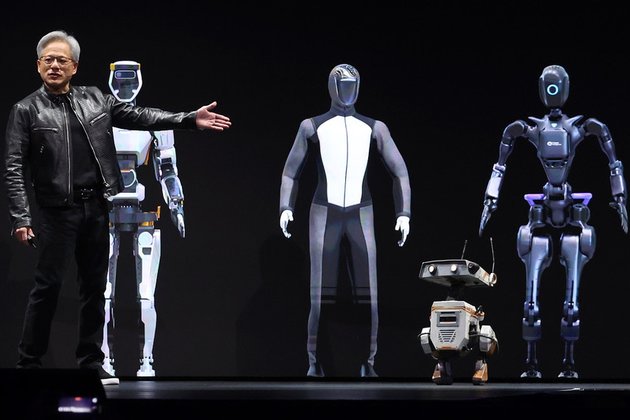March 20, 2024: Nvidia, the US chipmaker with a market value of over $2 trillion, has expanded its leadership position in the sphere of artificial intelligence Notice is showcasing several groundbreaking technologies at its annual developer conference on Monday.
The company presented the “Blackwell” series of AI chipsdesigned to run the expensive data centers that train state-of-the-art AI models comparable to the most recent generations of GPT, Claude and Gemini.
The Blackwell B200 chip is a major upgrade over Nvidia’s previous H100 AI chip, reducing the chip count and power required to coach an enormous AI model like GPT-4 by 75%.
The company also introduced the GB200 “Superchip” that mixes two B200 chips and Nvidia’s Grace CPU on a single board, providing “30x performance” for server farms running chatbots like Claude or ChatGPT, while reducing energy consumption by as much as 25x times reduced.
Nvidia CEO Jensen Huang showed off even larger configurations, comparable to the GB200 NVL72, a single server rack with 72 B200 chips connected by nearly three kilometers of cable, and the DGX Superpod, which mixes eight of those racks into an AI in Shipping container size combines data center in a single box.
In addition to the brand new AI chips, Nvidia announced Project GR00T, a basic model for controlling humanoid robots.
This model, paired with the Jetson Thor system-on-a-chip, goals to create autonomous machines that could be instructed using natural language to perform common tasks, even those for which they’ve not been specifically trained.
“Project GR00T will help robots understand natural language and mimic movements by observing human actions – quickly learning coordination, dexterity and other skills to navigate, adapt and interact with the true world,” Huang explained.

Nvidia has also entered the quantum computing space with the launch of a cloud service that uses its AI chips to simulate quantum computers.
Although the service is not going to initially be connected to an actual quantum computer, it’ll allow researchers to check their ideas without the effort of accessing rare and expensive quantum hardware.
In the long run, Nvidia plans to offer access to third-party quantum computers through the platform.
As Nvidia continues to push the boundaries of artificial intelligence and robotics, the corporate’s latest innovations underscore its commitment to leading the industry and shaping the long run of those transformative technologies.
This article was originally published at www.greataiprompts.com





